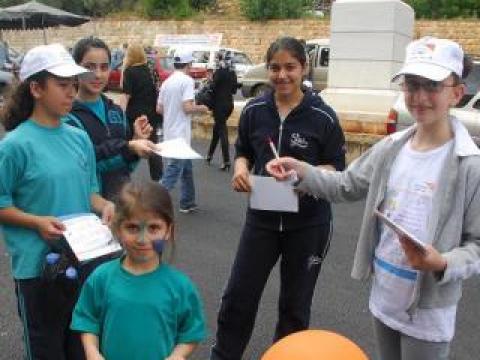‘Healthy’ peer pressure fights smoking in Lebanon

“I know that we have more hope with children than we have with adults,” said Yasmina, 12. “By raising awareness among children now, we help them not smoke as adults, because it is very difficult for grown-ups to stop smoking”, added Yasmina who has been part of the anti-smoking campaign.
We have good health and if we lose it because of smoking noone can help us restore it“Children imitate adults and sometimes imitate other children,” said Dounya, 11. “They think it is cool, and they soon get used to it and this is bad.”
Over the past two months, 110 children from Marjeyoun, Beirut and the Bekaa engaged in various anti-smoking sessions that included leadership skills training. Children learned more about the side effects of smoking tobacco and analysed advertisements that promoted it. Children even role-played a TV show debating the side effects of tobacco and peer-pressure situations.
Peer pressure can be a major negative force in the lives of children and adolescents, often resulting in their experimentation with tobacco, alcohol, and illegal drugs.
“Working with the Children’s Council for two years now, I never saw them so captivated by any topic, eager to learn and craving to share their knowledge to their peers,” said Mario Stephano, World Vision Children’s Council Coordinator. “It was a topic that simply grabbed their attention fully.”
After finalising the sessions, children designed posters showing anti-smoking slogans and scientific tips aimed at teaching young people how to refuse offers for cigarettes. Children then participated in community events such as a marathon and mini-festivals and distributed the posters at the same time.
Nurturing strong self-esteem among children and adolescents has been key to the campaign, recognising that these, helps children and youth to make healthy decisions and follow them, explained Stephano.
World Vision believes that children are agents of their own lives and they have the competence for decision-making“My father smokes a lot and it bothers me a lot but he cannot quit,” said Ihab, 12. “I hope all fathers stop smoking for the sake of their children.”
In Lebanon there are few restrictions to prohibit smoking in public places and smoking is socially accepted.
Through this child-led campaign, World Vision encouraged children to become peer educators in relation to smoking prevention. World Vision believes that children are agents of their own lives and they have the competence for decision-making in accordance with their evolving capacities.
“We have good health and if we lose it because of smoking noone can help us restore it,” said Melissa 14. “Even if adults are careless about their health, children should not be.”
-Ends-
We have good health and if we lose it because of smoking noone can help us restore it“Children imitate adults and sometimes imitate other children,” said Dounya, 11. “They think it is cool, and they soon get used to it and this is bad.”
Over the past two months, 110 children from Marjeyoun, Beirut and the Bekaa engaged in various anti-smoking sessions that included leadership skills training. Children learned more about the side effects of smoking tobacco and analysed advertisements that promoted it. Children even role-played a TV show debating the side effects of tobacco and peer-pressure situations.
Peer pressure can be a major negative force in the lives of children and adolescents, often resulting in their experimentation with tobacco, alcohol, and illegal drugs.
“Working with the Children’s Council for two years now, I never saw them so captivated by any topic, eager to learn and craving to share their knowledge to their peers,” said Mario Stephano, World Vision Children’s Council Coordinator. “It was a topic that simply grabbed their attention fully.”
After finalising the sessions, children designed posters showing anti-smoking slogans and scientific tips aimed at teaching young people how to refuse offers for cigarettes. Children then participated in community events such as a marathon and mini-festivals and distributed the posters at the same time.
Nurturing strong self-esteem among children and adolescents has been key to the campaign, recognising that these, helps children and youth to make healthy decisions and follow them, explained Stephano.
World Vision believes that children are agents of their own lives and they have the competence for decision-making“My father smokes a lot and it bothers me a lot but he cannot quit,” said Ihab, 12. “I hope all fathers stop smoking for the sake of their children.”
In Lebanon there are few restrictions to prohibit smoking in public places and smoking is socially accepted.
Through this child-led campaign, World Vision encouraged children to become peer educators in relation to smoking prevention. World Vision believes that children are agents of their own lives and they have the competence for decision-making in accordance with their evolving capacities.
“We have good health and if we lose it because of smoking noone can help us restore it,” said Melissa 14. “Even if adults are careless about their health, children should not be.”
-Ends-
Share